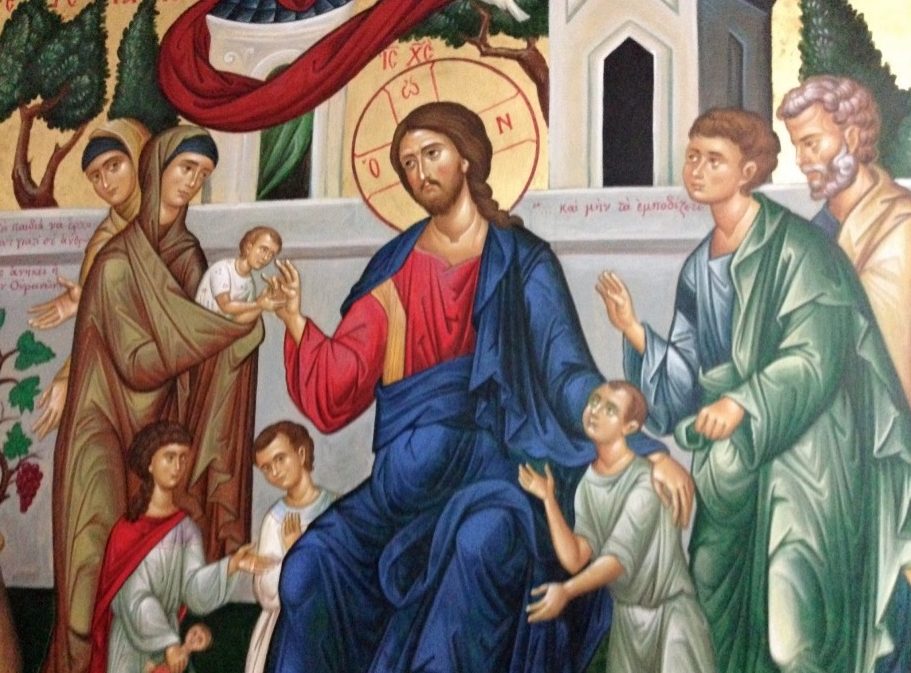NOTE: This English-language translation has not been approved by any liturgical commission. As it does not appear in the English-language Book of Needs, but yet is in the Grand Euchologe and the Agiasmatarion, it is being offered simply as scholarly work from the works of Schema-Archimandrite John (Lewis +2007).
AKOLOUTHIA FOR THE ADOPTION OF A CHILD
The priest, vested in his vestments, opens the beautiful gate. He/she who is going to be adopted as a son or daughter stands closest to the beautiful gate, he who is going to become the father stands in back; both carry a lighted candle.
Priest: Blessed is our God, always, now and ever and unto the ages of ages.
Reader: Amen.
Priest: Glory to Thee, our God, glory to Thee.
Heavenly King, O Paraclete*, the Spirit of truth, who art everywhere
present and fillest all things, the treasury of good things and bestower of life,
come and tabernacle* in us and cleanse us from every stain and save,
O Good One, our souls.
Reader (trisagion prayers):
Holy God (3x)…
Glory…both now …
All-holy Trinity …
Lord have mercy (3x) …
Glory…both now …
Our Father…
During every ekphonesis all make the sign of the cross and bow.
Priest: For Thine is the kingdom and the power and the glory, of the Father and of the
Son and of the Holy Spirit, now and ever and unto the ages of ages.
Reader: Amen.
The apolytikion of the day is chanted and the kontakion of the saint of the monastery or church.
Then the priest says this prayer:
Priest: Let us entreat the Lord.
Choir: Lord have mercy.
Priest: O Lord God, who through Jesus Christ, thy beloved child, calls us
thine own children, by the mystery of adoption and the grace of thy holy,
and almighty Spirit; Thou who has said:”I shall be for him a father, and
he shall be for me a son”, do Thou Thyself, O man-befriending* King, look,
from on high of they holy dwelling toward thy servants here present; and
them that nature has given birth as strangers one to the other according to
the flesh, make them a father and a [son or daughter] by thy Holy Spirit.
Strengthen them by thy love, unite them by thy blessing, bless them for
thy glory, establish them in the faith, guarding always, without
invalidating, that which results from their mutual agreement. Be the mediator of
their promise, so that that relation established before Thee,
they may maintain it until the end of their lives, indissoluble and true, by
placing Thee in the center of their existence, Thou our only living and true
God; and make them inheritors of they Kingdom.
For to Thee is due all glory, honor and worship, to the Father and to the
Son and to the Holy Spirit, now and ever and unto the ages of ages.
Choir: Amen.
Priest: Peace to all.
Choir: And to thy spirit.
Deacon: Let us bow our heads to the Lord.
Choir: To thee, O Lord.
Priest: O Master, Lord, our God, the fashioner of all creation, who in the first
Adam hast established a natural kinship according to the flesh and who,
by grace, in Christ, thy beloved Son and our God, hast made us also to
enter into thy kinship; before Thee who alone knowest all beings even
from their birth, thy servants here present bow their heads, asking thy
blessing, so that having recorded before Thee their mutual bond of father
and [son or daughter], they may obtain that which they hope for and live
in a manner worthy of the state which devotes upon them and by the
adoption sealed in Thee.
So that in this, as in all things, thine all-holy name be glorified, together
with thine only-begotten Son and the Holy Spirit, now and ever and unto
the ages of ages.
The priest makes a sign to the son or daughter to turn around.
The new child, having put aside his/her candle, prostrates himself/herself at the feet of the new father who says:
Father: Today, thou art my [son or daughter], today, I have begotten thee.
The father bends to raise up the child, and they both kiss each other.
The priest then makes a homily, then he blesses them:
Priest: The blessing of the Lord be upon you, by his divine grace and love for
mankind*, always: now and ever and unto the ages of ages.
Choir: Amen.
Priest: Glory to Thee, O Christ God, our hope, glory to Thee.
And the apolysis.
Notes:
- Paraclete: The translator preferred the word “Paraclete” in place of the more commonly used “Comforter”.
- Tabernacle: The translator preferred the word tabernacle, which may be used as a verb to signify to dwell in, as if in a tabernacle (a place of worship).
- Man-befriending: The translator uses the phrase “…O philanthropic King…”. He generally used the word Philanthropist to describe the Lord, in the more ancient etymology of the word signifying He who loves mankind, see: https://www.etymonline.com/word/philanthropist
- “love for mankind”: The translator uses the phrase “…by his divine grace and philanthropy…”.
From the:
Grand Euchologe, pages 582.
Agiasmatarion, volume 3, pages 286-287.
Translated by Schema-Archimandrite John (Lewis +2007) 1996

